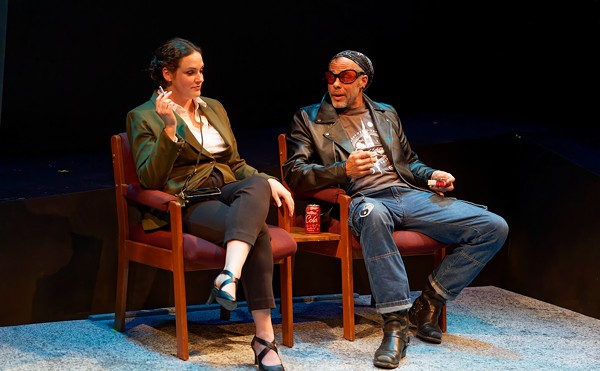HotCity Theatre's production of Orpheus Descending, directed by Carolyne Hood, embraces the lurid aspects of Williams' script, particularly in the lighting. Cued by Valentine's remark that "we live in a world of light and shadow," Doug Provost creates an expressionistic design that contrasts with the realistic elements of set and costume. Using dramatic color shifts, sharp patterns and an almost constant movement of light and shadow around the characters, Provost creates psychologically driven lighting changes that are often distracting, pulling the audience out of compelling moments of conflict. Combined with the sometimes overwrought sound effects (an unexplained siren, a heartbeat), the highly dramatic lighting design pushes the play toward melodrama.
What keeps the production grounded are the rock-solid performances provided by the acting ensemble. Standouts include Julie Layton, who plays Carol Cutrere (a Blanche DuBois doppelgänger) as a fluttering bird trying to escape the cage of society. She shares a secret bond with Uncle Pleasant, eerily portrayed by Norman McGowan. Both William Burch (as Lady's controlling husband Jabe) and Jared Sanz-Agero (Sheriff Talbot) create authentic and ultimately frightening characters, which are complemented by the seemingly sweet but truly bigoted Beulah (Kim Furlow) and Dolly (Julie Venegoni).
Anchoring the show are Donna Parrone, Tyler Vickers and Chopper Leifheit. Parrone, as Lady Torrance, convincingly embodies a woman trapped in a loveless marriage who finds hope for a new life. Vickers, as the enigmatic Valentine, stirs buried passion in Lady Torrance. But it's Leifheit, playing Lady's former lover, who most convincingly exposes the grief and regret underpinning the lives of these characters. When Lady reveals secrets from their past, his simple response — "I didn't know" — is heart-breaking.
While the characters are super-sized in their passion and conflicts, this is not fast-food theater. Trimmed to a digestible length (under two and a half hours with intermission), the production is a multi-course meal that continues to improve as the evening progresses. The exposition-heavy first act is slow, but once the show settles into the main story, a sense of urgency kicks in, leading to an astonishing conclusion. All of Williams' metaphors and references pay off. The trapped bird continues banging on the bars of her cage; Lady's hope is dashed on Easter Saturday through a sacrificial act; and Valentine, who referred to himself as someone "who had never been branded," sees an end to those days.
Williams reportedly worked on Orpheus Descending for seventeen years, which may explain why many of the characters and situations seem to echo his better-known works. Orpheus may be most similar to A Streetcar Named Desire: In each, a sexually provocative outsider is ultimately expelled to maintain the status quo. Williams' critique of a community that values conformity over individuality is heard most clearly when Beulah points out that "ostracizing only works if everyone cooperates." In the world of this play, those who don't cooperate with maintaining society as sanctioned by the powers that be are pushed to the edges or eliminated. Orpheus Descending is a tragedy not just because the characters working to change their lives are unsuccessful, but because the questions raised about the tyranny of compromise remain relevant today.





